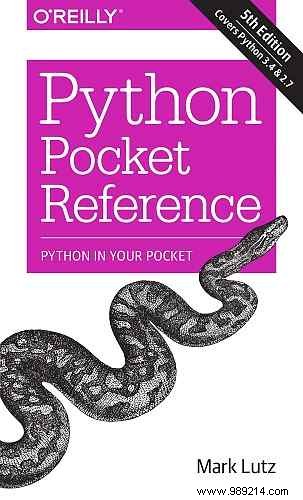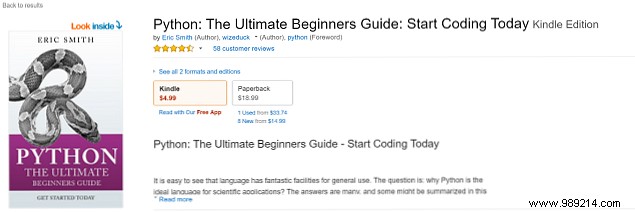The Kindle Store is the world's largest e-book retailer. It boasts over 4.6 million titles, and there is no suggestion that this number will drop any time soon. However, the cracks are starting to show, and it's unclear if Amazon will be able to paper them over.
In addition to flaws related to pricing and licensing, the Kindle Store is affected by the fate that lies ahead. all Online digital marketplaces:As posting gatekeepers have been removed, quality content has become surrounded by a lot of junk.
Hasty writing, cynically made garbage, designed to separate people from their money and offer nothing in return. So what can be done about all the problems the Kindle Store is currently having? Can Amazon change this situation and offer the service that we all deserve? Let's find out...
O'Reilly Media is one of the most recognized and respected technology publishers on the planet. What makes it so appreciated is the emphasis it places on quality. The books it publishes are written by the best developers and technologists in the world, experts in their fields. In addition, everything you publish is vigorously reviewed by an editorial team consisting of qualified copy editors and technical reviewers.
Books published by O'Reilly Media are easily identifiable by their distinctive covers, which feature animals drawn in black pencil. Just the presence of the “O'Reilly Animal” cover implies quality, in the same way that the Nissan logo does for cars. It is for this reason that some people set out to copy it.

A simple walk through the Kindle Store reveals many books. “paying tribute” to this iconic style. Check out this book by Steve Tale and WizeDuck called SQL:The Ultimate Beginners Guide . Looking at it, you'd guess it was an official O'Reilly publication. But it's not. Not at all.

This is not an isolated incident. Another book published by WizeDuck called Python:The Beginner's Guide, written by Eric Smith, it also appropriates elements of O'Reilly's look.

I've also noticed a number of books adopting the aesthetic of Apress, another well-known and well-respected tech publisher. While we can't be sure if this is deliberate or accidental, there is a very real possibility that consumers could be misled. And that's bad for all concerned.
If these books were published through a traditional publisher, someone from the editorial department or the legal department would have prevented this from going to a printer. They would have realized that it may infringe on O'Reilly's intellectual property. At the very least, they would have blocked publication on the grounds that Using the same design choices as another publisher undermines the credibility of the book. .
But Amazon's Kindle Store isn't a traditional publisher, and both books are selling for $4.99.
Many people dream of being published authors. I am one of them. I've been trying to do NaNoWriMo for several years running NaNoWriMo.org - Write a Novel in 30 Days! NaNoWriMo.org - Write a novel in 30 days! Read More
Until very recently, it was the case that if you wanted to see his name on the spine of a book, you would have to convince a publisher to take a chance on your manuscript or, more likely, pay for self-publishing. The latter could potentially cost tens of thousands of dollars when the cost of manufacturing, distribution, and marketing were factored in.
But that all changed about 10 years ago with the print-on-demand revolution. 4 Quick Ways to Write and Publish Books on the Web 4 Quick Ways to Write and Publish Books on the Web It's easier than ever to turn your words into a published book. These innovative tools allow authors to take their ideas beyond the print-on-demand type of desktop publishing. Read more . It all started with sites like Lulu.com, and later Createspace.com and Kindle Direct Publishing. These allow(ed) an author to upload a manuscript and sell it, without having to create and maintain stock. Suddenly, books could be printed as orders came in.

One consequence of this is that the Kindle Store is now awash with millions of self-published books. Your Guide to Desktop Publishing:From Print to Kindle and Beyond! Your Guide to Desktop Publishing:From Print to Kindle and Beyond! They say that everyone has a book in them. The moment of completion brings a mixture of immense satisfaction…and a confused and horrified reality:“How the hell am I going to publish it??” Read More As the late journalist Christopher Hitchens once quipped, “Everyone has a book inside them, which is exactly where it should stay. “.
There is an even darker side to the print-on-demand phenomenon. Some people have created software that automates the process of creating an e-book. It finds content on the internet and scrapes it. It is then included in a single document and sent to Amazon. Some people are releasing dozens of books every day. All of them are of low quality and many are full of stolen work. It's a horrible, disgusting industry..
The Kindle Store is literally being crushed under the weight of this spam. The technology section is especially vulnerable to it. Just search for a particular programming language, like Python or C#, and you'll find dozens of books that are essentially stolen blog posts and repackaged Wikipedia entries.
Although Amazon is working hard to identify and remove these e-books, it is more than apparent that the company cannot cope, as their number increases every day. Amazon is fighting a losing battle.
Although Kindle eBooks are a virtual product and therefore do not have the associated manufacturing and storage costs of traditional paperbacks, they cost almost as much as their print equivalents. For many consumers, this seems difficult to justify.

In Amazon's defense, the company is not entirely responsible for this. Even though Amazon takes a hefty cut of profits (between 30% and 65% for self-published titles, plus the cost of delivering the book to the reader), publishers set the prices for e-books. For whatever reason, they have chosen to make them as close to the paperback equivalent as possible.
Also, depending on where you live, eBooks are subject to sales tax. In the UK, for example, print books are tax-free, but e-books are taxed at the standard 20% VAT rate.
Another complaint many have with Kindle eBooks is that, unlike paperbacks, you don't own them, you buy a license.
So what does this mean in practice? Well, let's start with the obvious. You cannot resell them online or at a second-hand bookstore. You can't lend them to a friend or donate them to a thrift store. There is no thriving secondary market for e-books.

Given the relatively high cost of eBooks, it could be argued that this completely undermines their value proposition. But one could argue, since previously we have Suck Books:Why I Love My Kindle More Than Dead Trees Suck Books:Why I Love My Kindle More Than Dead Trees Modern e-readers hold thousands of novels, weigh next to nothing, have been built in the lights, and don't get a concussion when they touch your nose. Read More
However, this lack of ownership of digital products is sure to be a point of contention for many years to come, and there is no obvious or easy solution for those seeking to appease both sides of the battle with a fair compromise.
After reading this article, you could be forgiven for thinking I have a problem with Amazon. But nothing could be further from the truth. I have a Kindle Paperwhite, and I love it. I found out that since I bought it during Amazon Prime Day this year, what is Amazon Prime Day and how do I get the best deals? What is Amazon Prime Day and how do I get the best deals? Amazon Prime is one of the best consumer events in the last decade. It truly brought online shopping to the masses and transformed the way we approach shopping. Read More It is the perfect travel companion..
But while I love the hardware, I recognize that there are some fundamental issues with how the Kindle Store works.
In many ways, it's analogous to the problems Microsoft, Google, and Apple have in trying to keep low-quality, deceptive apps from their app stores. Don't kid yourself! 5 Tips to Avoid Fake Apps in the Windows Store Don't be fooled! 5 Tips to Avoid Fake Windows Store Apps The Windows Store has been spoiled by useless junkware and scams. Microsoft recently purged many fake apps, but the store still features questionable apps. We show you how not to get scammed. Read more . With the sheer amount of content being submitted to the Kindle Store on a daily basis, Amazon can't expect to filter out low-quality content.
Ideally, Amazon would have a more streamlined (and visible) process for reporting low-quality and fake titles, and would have enough dedicated workers to look into these complaints. But until this becomes a bigger problem for more people, it's unlikely to happen.
What do you like about the Kindle Store? And what do you hate about it? Do you think he is perfect in every way, rejecting our complaints? Or do you agree with the above, and feel moved to push Amazon in the direction of fixing the Kindle Store? Please let us know in the comments below.